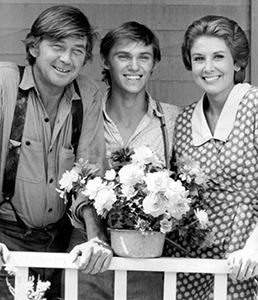Writer
Potts Pages - Write What You Know or Not
March 31, 2016

On March 24, Earl Hamner, Jr., novelist, screenwriter and TV writer, died at the age of 92. You may not recognize his name you will certainly recognize his work. He is the author of the novel "Spencer’s Mountain" and creator of TV show "The Waltons" based on this novel.
I have always loved this show. It was good family entertainment at its best. So, it was a special thrill last spring, at the Southern Kentucky Bookfest, when I got to meet Mary McDonough, who played Erin Walton. Mary, also a talented author, was very friendly and sweet, just like you would expect a Walton to be.
Other than the entertainment value, one reason that I loved “The Waltons” was that I related to the writing woes of John Boy’s character that was based on Hamner himself. Mr. Hamner was a prime example of the “write what you know” lesson that you hear at every writer’s conference.
He crafted this series on his childhood, and each character was given the attributes of members of his own family. The setting was the Blue Ridge Mountains in Virginia during depression-era in which he grew up; the Walton house was based on his childhood home, and even the ritual of calling goodnight to family members came from Hamner’s own experience.
Yes, Hamner definitely wrote what he knew in this series but this was not his only work. He also created the 80’s prime time drama “Falcon Crest.” He wrote episodes of “The Twilight Zone,” adapted E.B. White’s book “Charlotte’s Web” into a screenplay and wrote for various other TV shows.
I think Mr. Earl is definitely an example for us to follow of writing what you know, but I think he is also a good of example of going beyond the familiar. I am not suggesting that we all go out and write a prime time soap opera. But, think how differently, the characters of “Falcon Crest” and their California vineyard lived from those of “The Waltons.” I am sure writing both were challenging for him. The first, at times, probably got personal and tapped into memories and emotions. While, the latter involved research and imagination.
Writing what you know is a great place to start but sooner or later the “what you know” fountain is going to run dry. We need to be open to new ideas, constantly learning and stretching our mind and our writing experience. If you are a writer, look for writing opportunities that will challenge you to learn a new subject or technique.
We not only need to do this as writers but also as Christians we need to look for new experiences in life that get us out of our comfort zone and help us grow. If we do this, we may find that God will use us in a new way.
“Wise men and women are always learning, always listening for fresh insights.” (Proverbs 18:5) (MSG)
I have always loved this show. It was good family entertainment at its best. So, it was a special thrill last spring, at the Southern Kentucky Bookfest, when I got to meet Mary McDonough, who played Erin Walton. Mary, also a talented author, was very friendly and sweet, just like you would expect a Walton to be.
Other than the entertainment value, one reason that I loved “The Waltons” was that I related to the writing woes of John Boy’s character that was based on Hamner himself. Mr. Hamner was a prime example of the “write what you know” lesson that you hear at every writer’s conference.
He crafted this series on his childhood, and each character was given the attributes of members of his own family. The setting was the Blue Ridge Mountains in Virginia during depression-era in which he grew up; the Walton house was based on his childhood home, and even the ritual of calling goodnight to family members came from Hamner’s own experience.
Yes, Hamner definitely wrote what he knew in this series but this was not his only work. He also created the 80’s prime time drama “Falcon Crest.” He wrote episodes of “The Twilight Zone,” adapted E.B. White’s book “Charlotte’s Web” into a screenplay and wrote for various other TV shows.
I think Mr. Earl is definitely an example for us to follow of writing what you know, but I think he is also a good of example of going beyond the familiar. I am not suggesting that we all go out and write a prime time soap opera. But, think how differently, the characters of “Falcon Crest” and their California vineyard lived from those of “The Waltons.” I am sure writing both were challenging for him. The first, at times, probably got personal and tapped into memories and emotions. While, the latter involved research and imagination.
Writing what you know is a great place to start but sooner or later the “what you know” fountain is going to run dry. We need to be open to new ideas, constantly learning and stretching our mind and our writing experience. If you are a writer, look for writing opportunities that will challenge you to learn a new subject or technique.
We not only need to do this as writers but also as Christians we need to look for new experiences in life that get us out of our comfort zone and help us grow. If we do this, we may find that God will use us in a new way.
“Wise men and women are always learning, always listening for fresh insights.” (Proverbs 18:5) (MSG)
Sue

|
Comments:
Post a Comment